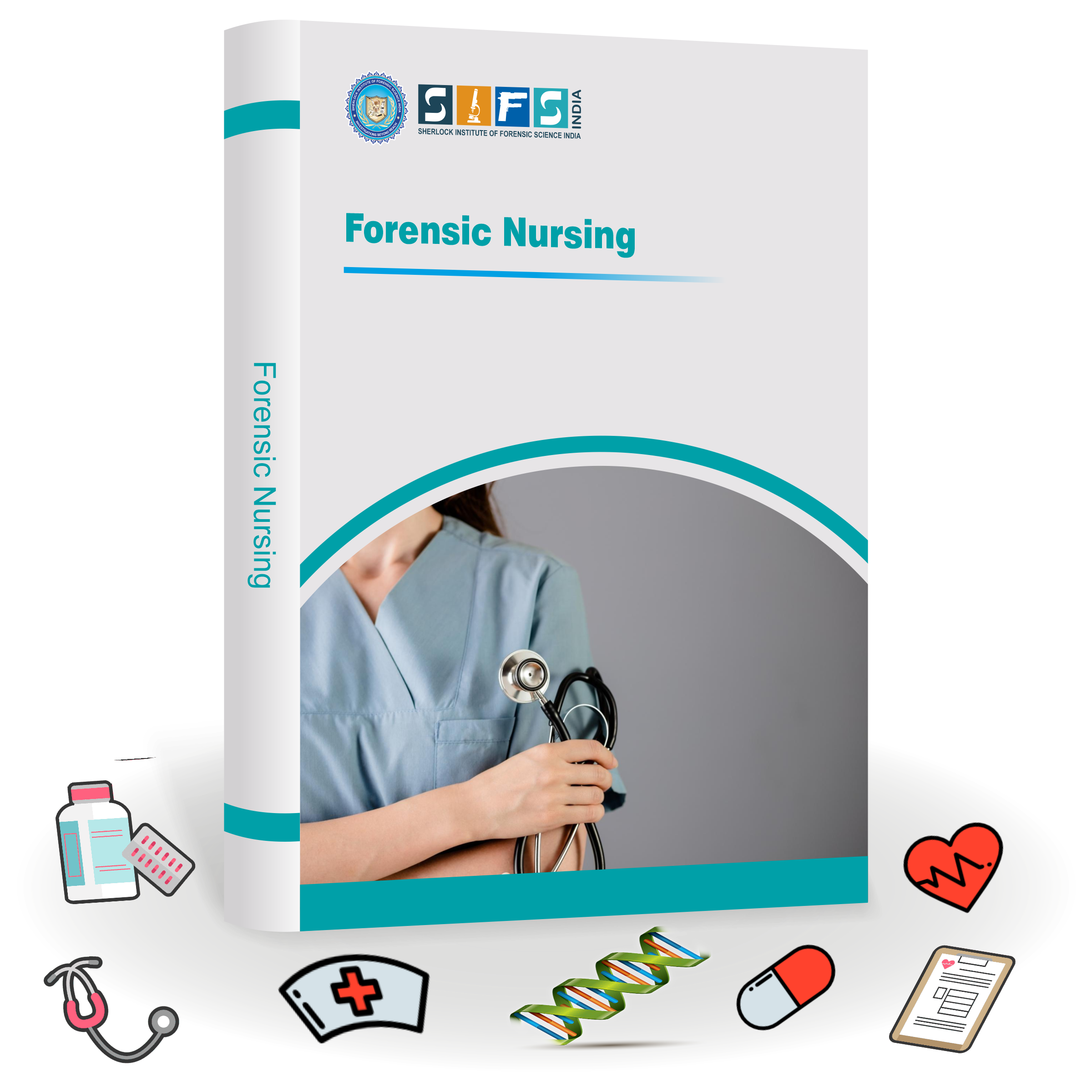MODULE 1 - INTRODUCTION TO FORENSIC NURSING
In this module, you will gain a basic overview of forensic nursing like, its concept, history, scope and significance, and evolution, and how it acts as a bridge between healthcare and the legal system. You will also explore the role forensic nurses play in medico-legal investigations and their ethical responsibilities when handling sensitive cases. The module also familiarizes you with the regulatory framework governing nursing practice in India, including the INC and SNC Acts, along with key international guidelines shaping professional standards.
MODULE 2 - MEDICO-LEGAL ASPECTS IN FORENSIC NURSING
In this module, you will understand the legal foundations essential for forensic nursing practice. You will learn about the law and legal system, the difference between civil and criminal cases, court structure in India and how to handle medico-legal responsibilities with proper documentation and reporting. The module emphasizes ethical and legal accountability, awareness of fundamental rights, and detailed study of the POSCO Act to protect minors. You will also gain skills to maintain accurate medico-legal records and support justice through professional and lawful nursing practices.
MODULE 3 - FORENSIC NURSING IN CRIME SCENE INVESTIGATION
In this module, you will learn how forensic nurses contribute to crime scene investigations through evidence recognition, collection, handling, and preservation. You will explore the concept of forensic evidence and its various types (biological, physical, and chemical) and their importance in solving cases. The module highlights the collaborative role of nurses with law enforcement, the significance of maintaining a proper chain of custody, and the role nurses play in maintaining the confidentiality of the evidence and ethical practices related to handling cases.
MODULE 4 - FORENSIC NURSING IN HEALTHCARE AND THE LEGAL SYSTEM
In this module, you will explore the intersection of healthcare and law in forensic nursing. You will understand the role and responsibilities of forensic nurses within hospitals, emergency, trauma care units and critical care settings while addressing both medical and legal aspects. Emphasis is placed on providing compassionate care to victims of violence, abuse, or neglect, while adhering to ethical principles in challenging situations. You will also gain insight into documentation and reporting standards, ensuring that medical records are accurate, confidential, and legally admissible in court proceedings.
MODULE 5 - FORENSIC NURSING IN DOMESTIC VIOLENCE CASES
In this module, you will learn to identify and address domestic violence in all its forms, like physical, emotional, sexual, and psychological. You will understand the forensic nurse’s role in handling such sensitive domestic violence cases through evidence collection, assessment, and accurate documentation. The module emphasizes the importance of victim-centered care to ensure safety, dignity, and support for survivors. You will also explore techniques for assessing the risk of interpersonal violence and the importance of cultural sensitivity and diversity when working with individuals from varied social and cultural backgrounds.
MODULE 6 - FORENSIC NURSING IN SEXUAL VIOLENCE CASES
In this module, you will gain a deep understanding of the role, responsibilities, and duties of forensic nurses in sexual violence cases. You will also learn about the challenges forensic nurses face while handling these cases and how they support survivors with compassion and professionalism. The module also covers Sexual Assault Nurse Examiner (SANE) programs, Sexual Assault Response Team (SART), procedures and protocols for handling evidence in sexual assault cases, and advancements in forensic nursing related to sexual violence. You will also explore crisis intervention techniques, psychological support for victims, and the importance of self-care for forensic nurses to handle emotional and professional challenges.
MODULE 7 - CHILD ABUSE RECOGNITION AND ASSESSMENT
This module focuses on understanding and assessing different types of child abuse (physical, emotional, sexual, and neglect cases) and signs and symptoms related to each abuse type. You will understand child developmental stages to identify age-related behaviors versus signs of abuse. The module also explores effective interview and assessment techniques along with prioritizing the child’s safety and legal rights. You will also gain understanding of interdisciplinary collaboration among healthcare, legal, and social service professionals to ensure all-round child protection and advocacy.
MODULE 8 - GERONTOLOGICAL NURSING AND ELDER ABUSE
This module gives you an overview of the growing concern of elder abuse and its various forms (physical, emotional, financial, and neglect). You will learn ways to identify vulnerable elderly populations, understand the prevalence and impact of abuse, and develop skills for accurate assessment and documentation. The module focuses on various sensitive interview techniques to minimize re-traumatization and overcome communication challenges common with older victims, thereby helping forensic nurses to provide effective care to elderly victims while maintaining their safety and dignity.
MODULE 9 - FORENSIC NURSING IN DISASTER RESPONSE
In this module, you will gain an understanding of disaster, and mass casualty concept, the role of forensic nurses in disaster management, Disaster Victim Identification (DVI) protocols, and ways to provide trauma-informed care to support survivors with empathy and ensure ethical and professional conduct during crisis situations. The module also focuses on the importance of maintaining evidence integrity in challenging environments and the value of interdisciplinary collaboration with emergency, medical, and legal teams to ensure effective and coordinated disaster response.
MODULE 10 - ROLE OF FORENSIC NURSING IN MORTUARY
This module highlights the critical role of forensic nurses in mortuary settings, where they assist in documenting, collecting, and preserving evidence from the deceased. You will gain skills in conducting systematic assessments of the deceased's body to support medico-legal investigations. The module also highlights the nurse’s role in communicating with families of the deceased with sensitivity and professionalism. Additionally, you will explore emerging technologies and modern techniques that enhance accuracy, efficiency, and compassion in mortuary-based forensic nursing practice.
MODULE 11 - ETHICAL FOUNDATION OF FORENSIC NURSING PRACTICE
In this module, you will explore the ethical principles that guide forensic nursing practice. You will understand the importance of maintaining confidentiality, privacy, and objectivity while conducting forensic examinations. The module emphasizes the need for informed consent, patient autonomy, and the nurse’s duty to care for vulnerable populations with empathy and respect. You will also learn the ethical aspects of interprofessional collaboration and nursing negligence, ensuring transparency in every stage of medico-legal and healthcare interactions.
MODULE 12 - FORENSIC MENTAL HEALTH NURSING ESSENTIALS
This module explores the intersection of mental health and forensic nursing. You will learn to assess and evaluate mental health conditions, collect relevant forensic evidence, and develop effective treatment plans for individuals involved in legal or criminal cases. The module also focuses on crisis intervention strategies to manage emotionally distressed patients and prepares you to provide expert testimony in court, ensuring your evaluations and observations contribute accurately to the justice process. You will also learn the status of responsibility for Crime for Mentally Ill Persons.
MODULE 13 - FORENSIC NURSING AND EXPERT TESTIMONY
In this module, you will learn how forensic nurses serve as expert witnesses by presenting medical findings clearly and confidently in court. You will understand how to prepare precise documentation, including photo and video evidence, to support legal proceedings. The module also introduces cross-examination techniques and the principles determining the admissibility of expert testimony, helping you develop credibility, professionalism, and confidence when communicating forensic evidence in judicial settings.




